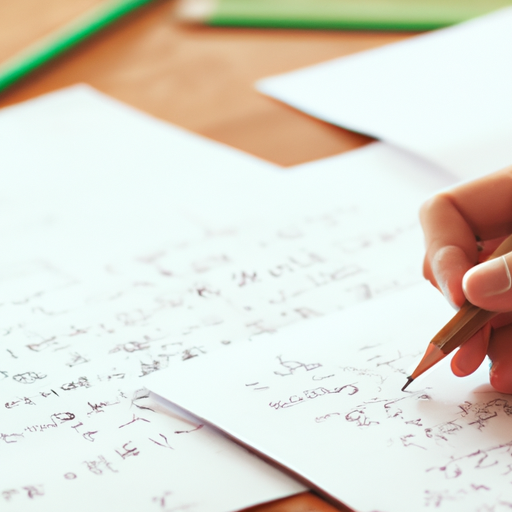Will it be incredible if you could ace GCSE Maths with ease? The guide “Mastering the Art of Active Learning: How to Pass GCSE Maths” has been meticulously designed to turn this dream into a reality. Navigate through an array of helpful content such as revision methods, the establishment of an effective study schedule, utilization of past papers, familiarizing with syllabus and exam board specifics, alongside various study techniques including the use of flashcards and mind maps. You’ll uncover insight on conducting mock exams, forming beneficial study groups, capitalizing on textbooks and online resources while mastering time management. The essence of active learning, the process of feedback, exam strategies, and subject-specific guides also find a thorough explanation. Furthermore, you’ll also learn about tutoring benefits, relevant practice questions, crafting a conducive study environment, maintaining consistency, setting effective goals and ensuring your well-being for an optimal learning experience. Boost your motivation and learn exactly how to pass GCSE Maths with this comprehensive guide!


Understanding the Exam Syllabus
Understanding your exam board
When it comes to passing your GCSE Maths exam, understanding your exam board is a fundamental starting point. Each exam board has slightly different content requirements and lesson styles. Therefore, by identifying and understanding your exam board, you ensure that your study material is more aligned with what you will be examined on. It’s akin to knowing your opponent in a competition. This means referring to your school, teacher, or school syllabuses for information.Getting familiar with the syllabus
Closely related to understanding your exam board is thoroughly familiarizing yourself with the syllabus. The syllabus is your study roadmap that outlines each topic you need to cover in your studies. It highlights what you need to know for the exam such as the concepts, the practicals, and the mathematical theories. Understanding these requirements makes it easy for you to tailor your revision to meet these specific needs.Having subject-specific guides
Subject guides offer step-by-step breakdowns of your syllabus, making your revision organized and manageable. Subject-specific guides provide detailed information about individual subjects you are studying. In regard to GCSE Maths, guides would delve into unique mathematical principles, formulas, and key concepts, illuminating areas that you should emphasize in your studies.Creating a Study Schedule
Time management strategies
Managing your study time effectively is significant in your quest to ace your GCSE Maths. This involves identifying your most productive times of the day, understanding the amount of time each topic requires for mastery, and allocating time for rest. A well-balanced study schedule incorporates study periods, breaks, rest, and time for other activities, ensuring you avoid burnout.Incorporating consistency
In any study plan, consistency is key. Mathematical theories and principles build upon one another, thus consistent and regular studying ensures you keep abreast with each new concept, making it a vital part of your success. Stick to your defined schedule as much as possible, and you’ll see continual progress in your understanding and retention of knowledge.Setting study goals
Study goals provide direction and help you monitor your progress. They also keep you motivated and engaged in your revision. Your goals should be specific, measurable, attainable, relevant, and timely (SMART). For example: “Score 80% on my GCSE Maths mock exam in three weeks.”
Active Learning Techniques
Utilizing flashcards
Flashcards are a dynamic way to study individual concepts and formulas, particularly in GCSE Maths where there are many formulas to remember. They promote active engagement, better retention, and allow for self-assessment.Creating mind maps
Mind maps are an excellent tool for visually organizing information, improving your understanding, memory and recall of key concepts. In Maths, they can be used to demonstrate relationships between different mathematical principles, or to provide an overview of a topic.Engaging in active reading
Unlike passive reading where you simply skim over text, active reading entails making notes, highlighting key points, asking questions, and summarizing information in your own words. By practicing active reading, you enhance your comprehension and maximize retention of information.Reliable Study Resources
Utilizing textbooks
Your textbook is a primary resource that provides content according to your syllabus. It offers comprehensive coverage of all topics you need to learn and usually includes examples, exercises, and practice questions.Exploring online learning resources
Online resources can complement your textbooks by offering a wealth of interactive content, video tutorials, self-assessment quizzes, and online forums. This makes it an important tool for reinforcing and expanding on what you’ve learned.Joining study groups
Study groups offer a collaborative learning environment where you can discuss difficult concepts, learn from others, and gain different perspectives. They also add a social dimension to your revision, making it more engaging and enjoyable.
Tackling Practice Questions
Understanding the importance of past papers
Past papers familiarize you with the exam structure, question style, and common themes. They are a perfect simulation of the actual exam experience, enabling you to practice and improve your timing and accuracy.Practising mock exams
Mock exams replicate the exam conditions and require you to apply your knowledge under time pressure. They help cement information, improve your speed, and give you clues about your understanding of the subject.Solving practice questions
Practice questions test your understanding of individual topics and concepts. They help improve problem-solving skills, speed, and accuracy, making you more exam-ready.Securing a Distraction-Free Study Environment
Creating a conducive learning space
Your study environment should be clean, organized, well-lit, and distraction-free. This implies having all your study materials at hand and making sure the study space is quiet and comfortable for effective learning.Retaining a distraction-free environment
Maintain order in your study space, keeping it free from clutter, noise, and other distractions. Putting away your phone or turning off notifications during study periods is also helpful in retaining focus.Maintaining your well-being
Remember, your physical and mental well-being are equally important. Regular breaks, hydration, physical exercise, healthy eating, and enough sleep should be factored into your study plan.Motivation for Studies
Finding the motivation to study
Keep reminding yourself of your goal and the feeling of accomplishment it will bring. Positive reinforcement, such as rewarding yourself for achieving a study goal, can also boost motivation.The importance of well-being
Ensure you take care of your mental and physical health. Exercise, good nutrition, and enough rest can not only boost your energy levels, but also your concentration and overall performance.Staying positive
Maintain a positive mindset, even when faced with challenges. Understand that it’s okay to make mistakes as they form part of the learning process. Believe in your ability to succeed.Identifying and Filling Knowledge Gaps
Receiving constructive feedback
Seek feedback from your teachers, tutors or study group members. Constructive feedback can help identify areas for improvement and pave the way to devise effective strategies to work on these areas.Self-assessment strategies
Self-assessment aids in identifying your strengths and weaknesses. This can be achieved through tackling quizzes, self-testing, or reflecting on your understanding after each study session.Getting a tutor
If there are concepts that you’re struggling with, consider hiring a tutor. Tutors can provide personalized instruction, clarify your doubts and help strengthen your understanding of difficult topics.Revision Strategies
Prioritizing key contents
Prioritize your revision according to the importance of topics outlined in the syllabus. Start by studying the most challenging topics, and work your way down. This ensures that you give extra attention to complex areas.Balancing strengths and weaknesses
Strengthen your weaknesses and maintain your strengths. Do not disregard areas of strength, but allocate more time to areas you find challenging to ensure a balanced revision.Effective revision activities
Incorporate activities like mind mapping, quizzes, flashcards, and teaching others. These activities reinforce understanding, aid memory and make revision more engaging.Exam Strategies
Understanding the exam format
Familiarize yourself with the exam format, the types of questions, and the marking scheme. This way, you’ll know what to expect, and you can prepare effectively.Knowing your exam timetable
Having an accurate exam timetable allows you to plan and manage your revision time more effectively. It also ensures that you won’t get caught off guard with an unexpected test.Planning your exam day
Plan about what you’ll bring, what you’ll wear, when you’ll leave home, and the transport you’ll take to the exam venue. On the exam day, remember to have a positive mindset, be calm, read questions carefully, and manage your time wisely. To pass your GCSE Maths, it is important that you understand your syllabus, create a study schedule, use active learning techniques, utilize reliable resources, tackle practice questions, maintain a conducive study environment, stay motivated, identify gaps in your knowledge, employ effective revision strategies, and have solid exam strategies. With these comprehensive strategies, you are well on your way to ace your GCSE Maths exam.Talk with teacher about helping your child with English, Maths, Science or 11 plus

Tagged Academic Success, Active Learning, Career Guidance, College Prep, Educational Resources, Educational Technology, English Skills, English Tutoring, Exam Preparation, Exam Strategies, gcse, Homework Help, Language Learning, Learning Disabilities, Math Mastery, Maths Education, Maths Tutoring, Online Tutoring, Parental Guidance, Reading Strategies, Remote Learning, Scholarship Opportunities, Science Explorations, Science Tutoring, STEM Learning, Student Motivation, Study Techniques, Study tips, Summer Learning, Test Preparation, Time Management, Tutoring Techniques, Writing Techniques



